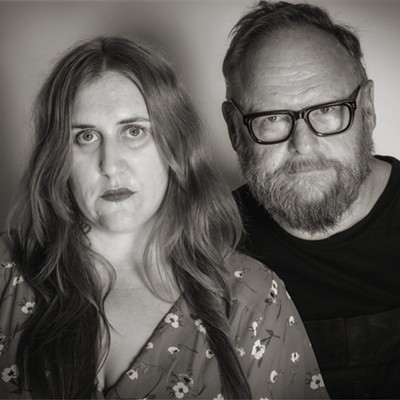The sky wasn't black with gun smoke anymore--it was just nighttime--and those tiny glimmers above us weren't fighter jets. I was sure of it. They were standing still, sending us a message of light from miles and miles away. Stars.
Tiny glimmers, sending messages of light, is more than just a description of actual stars, or of the band itself--it's also how you can describe each song on the Montreal band's fourth album. While some bands reflect on endings and catastrophes themselves, In Our Bedroom After the War explores what happens after. The record imagines what can happen on a personal, intimate level after a widespread traumatic event--the war here being intentionally ambiguous. In Our Bedroom After the War tells stories of looking toward the sky and living again.
"The idea of In Our Bedroom After the War is that you start anew again, whether it's a personal or political war that was going on in your life," said Stars guitarist and bassist Evan Cranley. "At the end of the day, you're left alone within four white walls to reflect on what's happened to you and be reborn again, in a way."
The album begins with "The Beginning After the End," an instrumental track that builds an electronic landscape culminating in the spoken lines, "Will we wake in the morning and know what it was for, up in our bedroom after the war?"
A few seconds later, "The Night Starts Here" begins, with Amy Millan's voice singing, "forget your name, forget your fear." Everything going on musically here evokes a sense of renewal: twinkling guitars, sparkling synthesizers and string chords swelling into fuzzed rhythms.
With "Take Me to the Riot" and "My Favourite Book," the mood levels out on an uplifting plane with pop and soul hooks, respectively. By the time "The Ghost of Genova Heights" hits, with its disco chorus, In Our Bedroom After the War has moved its gaze from the four white walls to the sky outside the window.
But as quickly as things became exuberant, they get contemplative again: "Personal" has Millan and Torquil Campbell singing e-mail messages in response to a personal ad over a mournful piano. In the course of four minutes, an entire romance is imagined and never happens: "I thought once that I saw you, I thought that you saw me. I guess we'll never meet now. It wasn't meant to be."
Life after war isn't all glimmer and light, but it's still life, and that's the important thing. Romance is, after all, imaginary--a version of possible reality. In Our Bedroom After the War, then, presents a series of romances, of imagined scenes of life as it could be, both tragic and beautiful, but always life. The common thread is that they are all just possibilities, and that life exists in the imagining of possibilities.
These possibilities, said Cranley, is what Stars' music is essentially always about: making stories for the listener to imagine themselves in--to live in, so to speak. "I think we create almost cinematic sounds, and I think you can think of our songs and sounds as little vignettes, little movies," said Cranley. "We've done our job as a band if you can put yourself in that movie that we're making the soundtrack for."
"Life 2: The Unhappy Ending" plays with this idea directly--the lyrics are packed with cinematic story conventions, with Campbell singing on the chorus, "Life was supposed to be a film, was supposed to be a thriller, was supposed to end in tears."
"Today Will Be Better, I Swear!" follows that song, with the title track ending the record: "She's gone, she left before you woke, as you ate last night, neither of you spoke," with piano chords and Campbell lamenting, " ... but at least the war is over."
Said Cranley: "It's a nice image, that after the trauma you've gone through, you're left to your own devices."
Left to imagine what happens next, and that moment of imagining, in your bedroom, after the war, is perhaps the most hopeful moment: The moment when you're sure the war, whatever war it was, is over.











